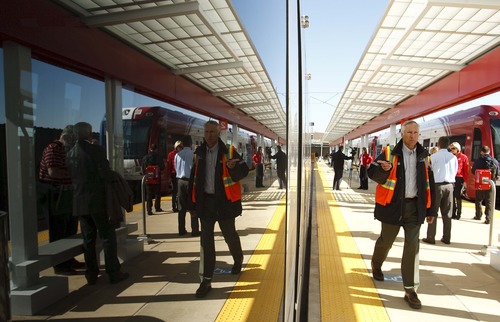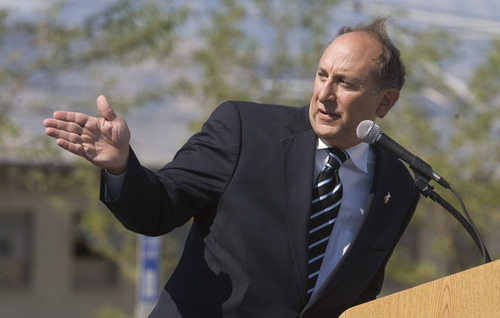This is an archived article that was published on sltrib.com in 2013, and information in the article may be outdated. It is provided only for personal research purposes and may not be reprinted.
Amid stories of big Utah Transit Authority executive salaries and bonuses, most rank-and-file UTA employees had not had a raise for two years while the agency and its labor union negotiated a new collective-bargaining agreement.
The wait is now over.
On Dec. 10, employees will receive a 2 percent pay raise.
The union employees will also soon receive a 2 percent bonus on their full 2012 pay.
"That helps for the year that they didn't get a raise," said Joe Hatch, lawyer for Amalgamated Transit Union Local 382.
The union overwhelmingly approved the new collective-bargaining agreement (89 percent to 11 percent) and the UTA Board approved it unanimously last week.
The new deal also has a schedule for raises of between 1 percent and 2 percent roughly every six months through 2016.
As an example of wages under the new accord, bus and train operators will now receive $19.51 an hour, up from $19.13. That will rise to $21.23 an hour by December 2016.
Other examples include that an "A-level mechanic" now will earn $25.22 an hour; rail-maintenance workers and transit vehicle technicians, $21.32; parts clerks, $19.49; shop janitors, $17.70; and coach cleaners, $16.70.
Hatch noted that the new agreement also puts $1 million into the employees' health trust fund, along with scheduled increases to it. "That will give them relief on their health insurance," he said.
"There are still a lot of disputes between the company and the union," Hatch said, that are being arbitrated outside of the new agreement.
He said one example concerns part-time drivers who had their pay cut earlier this year.
Those part-time drivers often work an hour or two in the morning and again in the evening to help with rush-hour routes. They had been paid a two-hour minimum each time they showed up to work. But this summer, UTA decided to pay them for exactly what they work. If they work an hour, they will be paid for an hour.
UTA management praised the agreement.
"We are very pleased to have a new collective-bargaining agreement for our employees," said General Manager Michael Allegra. "UTA's dedicated employees work hard every day to provide high-quality service to the community. After two years without an agreement, we are happy to move forward and provide our employees with improvements to their wages and benefits."
The new deal comes after UTA has been criticized in recent months over the pay, bonuses and travel of top executives.
For example, The Salt Lake Tribune recently reported that top UTA executives last year split $750,000 in bonuses for meeting goals that critics say were too easy to achieve. Top bonuses included $25,000 each to Allegra and General Counsel Bruce Jones.
Overall compensation for executives is high compared to other transit agencies, a past state audit found. Total 2012 compensation, including salary and benefits, was $365,763 for former UTA CEO John Inglish; $332,604 for Allegra; $329,616 for former Chief Financial Officer Kenneth Montague; and $312,794 for Jones, according to utahsright.com.
UTA defended its executive compensation.
"UTA's managerial salaries are at or below the national average for transit agencies," spokesman Remi Barron said.
"It takes a great deal of expertise and experience to plan and operate an agency of the size and scope of UTA's system. Our people are compensated based on their unique knowledge, skills and performance."





